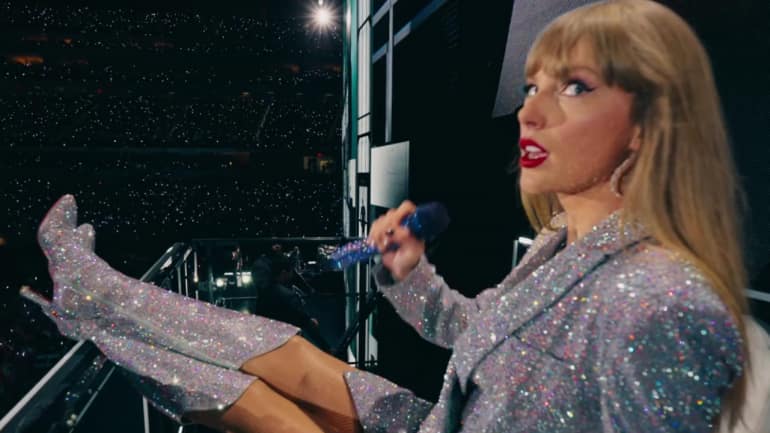



If 2023 has indeed served up the summer of girlhood, Taylor Swift has almost certainly orchestrated its definitive soundtrack. Even as the global star continues her Eras Tour in full throttle — on track to break Elton John’s record for the highest-grossing tour of all time — the film version arrived in theatres in India last Friday, weeks after its release elsewhere in the world.
The Eras Tour film, reported CNBC, is the highest-grossing domestic and global concert film release of all time, but lags just behind the “Michael Jackson’s This Is It” concert documentary’s global haul of $262.5 million. Opening for a limited run in India, initial reports pegged sales at 25,000 for pre-sale tickets. Within two days, at least in Delhi-NCR and Mumbai, tickets aren’t coming easy or cheap. Who would have thought?
 Taylor Swift Eras Tour
Taylor Swift Eras Tour
The Swifties’ Indian legion, which has been pining about Taylor Swift overlooking India on her tour circuit, are out to make the most of this moment. Twitter and Instagram are covered with videos of fans in theatres celebrating their queen’s arrival, if only on screen — incredibly, in the same kind of carnivalesque atmosphere that only Shah Rukh Khan seems to have been able to inspire.
As reports of disrupted screenings of Killers of the Flower Moon trickle in, it becomes obviously clear, yet again, the power that Taylor Swift exerts over her vast, very loyal fandom. It’s not just the stage and the screen that she’s dominating at the moment; not just theatres and arenas that she’s packing in. It’s the whole entire zeitgeist.
1989 (Taylor’s Version), the latest in a series of re-recordings of her previous albums, was released just a week ago, and quickly broke records. It became the fastest-selling record of 2023 in the UK, and the biggest-selling album of the year in the US.
Before that, Swift has also been giving tabloid fodder, stepping out on the pavements of New York, arms linked with Sophie Turner — turning the gossip mill about this unlikely friendship between Joe Jonas’ ex-beaus. And then she set tongues wagging when it appeared that she had begun to date NFL star Travis Kelce; triggering long listicles that document her dating history with a zeal woefully missing when it comes to some other, perhaps more significant geopolitical events.
If, like this writer, you’re not a Swiftie — if you can vibe with her songs but for reasons of age, preference or something else, cannot see what the darn fuss is all about — chances are you are puzzled by this worldwide enchantment with Taylor Swift. What is it about the art, words and persona of this 33 year-old upper middle-class American woman, the child of banker-financial experts, that resonates so hard, even with fans who have nothing in common with her, culturally speaking?
The answer perhaps lies in that big word of 2023: Girlhood. Consider the music that Taylor Swift — proactive, prolific, provocative, persistent — has produced in the last 16 years. Across 10 albums, Swift’s lyrical dexterity and ear for melody are evident. Music critics and industry veterans — Dolly Parton to Max Martin — have been won over by her ability to predict the turn of musical trends and instinctively know what she wants to put out.
But musical prowess aside, it is her determined, candid, authentic reckoning with adolescence and adulthood that matters most to Taylor Swift’s listeners. Whether she’s singing about unrequited love and heartbreak, fame and friendship, or just plain old growing pains, she makes her listeners feel seen. It helps that she routinely sends them on scavenger hunts, leaving red herrings for them to figure out what famous person her songs are about.
The world’s biggest pop artists, Madonna to Beyonce, have mined their real life experiences for their music, and for what they want to say through it. Extraordinarily, Swift is that person for Xinnellials and Gen Z — her message not outrightly femme, never so rebellious as to be almost out of reach. Swift’s feminism — and feminist she is no doubt — lies in standing up to authority, knowing her mind and going for it.
Her strength of mind is also evident in the way Swift has reacted to past incidents. A decade ago, Swift was at her peak, that first flush of fame, having won awards, delivered four massive albums that lived on the charts and proved her staying power, on the back of ditties about love and heartbreak.
And right then, at the top of her game, she was beginning to become to butt of jokes — Rolling Stone put her on its cover as “The Heartbreak Kid”, she was the cartoon they laughed at award shows like the Oscars and chat shows like Ellen, mocked for her serial dating, her so-called “obsession” with boys, the kiss-and-tell nature of her songwriting.
Then around 2014, Taylor Swift shifted gears — segueing from her country sound into a pop one, with the help of the great songwriter Max Martin. 1989 arrived all pop and shimmer; Swift in a new short bob, light and bright. Its sound was more clubby, its material, while still autobiographical, somewhat more introspective.
 Taylor Swift Eras Tour
Taylor Swift Eras Tour
Songs like Bad Blood, Welcome to New York, Blank Space and the anthemic Shake It Off defined this chapter of her story, but here, she was regarding it with sage-like mindfulness. We heard even more of this on her COVID-era albums, Folklore and Evermore, along with her openness to musical influences and willingness to initiate collaborations by instinct, whether it was Fun’s Jack Antanoff, or earlier, Kendrick Lamar on Bad Blood. All of this, too, spoke to her listeners; even earning her fans in places no one thought she would.
This boldness — in the face of a world that still believes it can tell its girls and women what to do and how to think — came through outside the studio too. That same year, Swift was on the warpath with Spotify. Before 1989 arrived, she had all her music from the world’s biggest music streaming platform because she believed that “people should feel that there is value to what musicians have created, and that’s that,” as she told Time magazine.
That move could well have eclipsed her — but didn’t, to the astonishment of an entire industry that was struggling with the ramifications of streaming. Swift proved there was always going to be a market for really good music. It turned out to be a shrewd flex, backed no doubt by her abundant talent, her brand of non-conformity, and a fanbase that she had actively been cultivating through an elaborate engagement strategy — private listening sessions, conversations over social media, personalised gifts and chats — that is now a case study at business schools.
The re-recordings of previous albums that Swift has been releasing for the past two years — which BBC calls an “ongoing campaign to regain control of her work, after an investment company bought her master tapes in 2019” — is also couched in that same aura of strong-headedness, her pursuit of creative freedom. But it is backed by the confidence born of her extraordinary relationship with her fanbase, who have lapped it all up — the music, the message, the universe, its purpose.
The fact is, plenty of pop stars of the 21st century have grown up in the public eye — Justin Bieber, Harry Styles, Selena Gomez were all teen idols who’ve demonstrated similar career-bending pivots to mint new audiences and continue to stay relevant. But few appear to be doing it with the candour and determination that Swift is, as she proceeds on the victory lap that is the Eras Tour. Fewer still are simultaneously raising a generation of women in their wake. That’s one thing about Swift no one can shake off.
Discover the latest Business News, Sensex, and Nifty updates. Obtain Personal Finance insights, tax queries, and expert opinions on Moneycontrol or download the Moneycontrol App to stay updated!